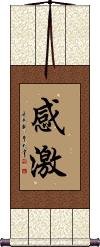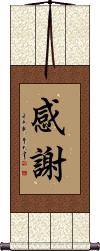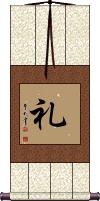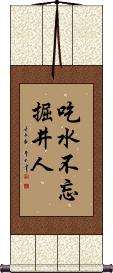Many custom options...
And formats...

Not what you want?
Try other similar-meaning words, fewer words, or just one word.
Gratefulness and Thankfulness in Chinese / Japanese...
Buy a Gratefulness and Thankfulness calligraphy wall scroll here!
Personalize your custom “Gratefulness and Thankfulness” project by clicking the button next to your favorite “Gratefulness and Thankfulness” title below...
Thankfulness
感激 is thankfulness or being grateful for what you have.
It is an attitude of gratitude for learning, loving, and being. Appreciate the little things that happen around you and within you every day. Think positively. Thankfulness brings contentment.
Different meaning in Japanese - more like "deep emotion," "impression," "inspiration" - not recommended for a Japanese audience.
Gratitude / Thanks
感謝 is gratitude; the feeling of being grateful or thankful.
You can think of this as being a formal way of expressing thankfulness in Chinese, Japanese Kanji, and old Korean Hanja.
Respect
Politeness, Gratitude and Propriety
礼 is one of the five tenets of Confucius.
Beyond respect, 礼 can also be translated as propriety, good manners, politeness, rite, worship, or an expression of gratitude.
We show respect by speaking and acting with courtesy. We treat others with dignity and honor the rules of our family, school, and nation. Respect yourself, and others will respect you.
 Please note that Japanese use this simplified 礼 version of the original 禮 character for respect. 礼 also happens to be the same simplification used in mainland China. While 禮 is the traditional and original version, 礼 has been used as a shorthand version for many centuries. Click on the big 禮 character to the right if you want the Traditional Chinese and older Japanese versions.
Please note that Japanese use this simplified 礼 version of the original 禮 character for respect. 礼 also happens to be the same simplification used in mainland China. While 禮 is the traditional and original version, 礼 has been used as a shorthand version for many centuries. Click on the big 禮 character to the right if you want the Traditional Chinese and older Japanese versions.
This is also a virtue of the Samurai Warrior
See our page with just Code of the Samurai / Bushido here
See Also: Confucius
Drinking the water of a well: One should never forget who dug it
This proverb suggests that one should always be grateful to those who helped one succeed.
And remember your ancestors and those that came before you whose sacrifices made your present life better.
Some Chinese will separate the intended meaning from this proverb and translate this as “Don't forget the people who once helped you.” In Modern China, this idiom is virtually never used to refer to an actual well.
Note: This can be pronounced in Korean but it's not a commonly used phrase.
Not the results for gratefulness and thankfulness that you were looking for?
Below are some entries from our dictionary that may match your gratefulness and thankfulness search...
| Characters If shown, 2nd row is Simp. Chinese |
Pronunciation Romanization |
Simple Dictionary Definition |
感激 see styles |
gǎn jī gan3 ji1 kan chi kangeki かんげき |
More info & calligraphy: Thankfulness(n,vs,vi) deep emotion; impression; inspiration |
感謝 感谢 see styles |
gǎn xiè gan3 xie4 kan hsieh kansha かんしゃ |
More info & calligraphy: Gratitude / Thanks(n,vs,vt,vi) thanks; gratitude; appreciation; thankfulness |
紉 纫 see styles |
rèn ren4 jen |
to thread (a needle); (bound form) to sew; to stitch; (literary) very grateful |
幸甚 see styles |
xìng shèn xing4 shen4 hsing shen koujin / kojin こうじん |
(literary) very fortunate (form) (usu. in letters) being extremely grateful; being much obliged; being very appreciative; being very happy |
忝い see styles |
katajikenai かたじけない |
(adjective) (kana only) grateful; indebted |
恐縮 see styles |
kyoushuku / kyoshuku きょうしゅく |
(n,vs,vi) (1) feeling (much) obliged; being (very) grateful; being thankful; (n,vs,vi) (2) (oft. before a request, as 恐縮ですが) feeling sorry (for troubling someone); feeling ashamed (e.g. of an error); feeling embarrassed (e.g. by someone's compliments, hospitality, etc.); (n,vs,vi) (3) (archaism) shrinking back in fear |
感恩 see styles |
gǎn ēn gan3 en1 kan en kanon かんおん |
to be grateful (n,vs,vi) gratitude; gratefulness; thanking; thanksgiving |
感戴 see styles |
gǎn dài gan3 dai4 kan tai |
sincerely grateful |
無任 无任 see styles |
wú rèn wu2 ren4 wu jen |
extremely (pleased, grateful etc) |
知報 知报 see styles |
zhī bào zhi1 bao4 chih pao chihō |
one who is grateful |
知恩 see styles |
zhī ēn zhi1 en1 chih en chion |
grateful |
辱い see styles |
katajikenai かたじけない |
(adjective) (kana only) grateful; indebted |
領情 领情 see styles |
lǐng qíng ling3 qing2 ling ch`ing ling ching |
to feel grateful to sb; to appreciate the kindness |
善知恩 see styles |
shàn zhī ēn shan4 zhi1 en1 shan chih en zen chion |
grateful |
有難い see styles |
arigatai ありがたい |
(adjective) (kana only) grateful; thankful; welcome; appreciated; evoking gratitude |
多とする see styles |
tatosuru たとする |
(exp,vs-i) to appreciate; to be thankful |
必有重謝 必有重谢 see styles |
bì yǒu zhòng xiè bi4 you3 zhong4 xie4 pi yu chung hsieh |
(we) will be very grateful (if ...) |
恐れ入る see styles |
osoreiru / osoreru おそれいる |
(v5r,vi) (1) to be sorry; to beg pardon; to be much obliged; to feel small; (2) to be grateful; (3) to be amazed; to be filled with awe; to be surprised; (4) to be disconcerted; to be embarrassed |
恐縮至極 see styles |
kyoushukushigoku / kyoshukushigoku きょうしゅくしごく |
(adj-na,adj-no) extremely grateful |
恩に着る see styles |
onnikiru おんにきる |
(exp,v1) to feel indebted (to); to feel grateful; to be much obliged |
感恩圖報 感恩图报 see styles |
gǎn ēn tú bào gan3 en1 tu2 bao4 kan en t`u pao kan en tu pao |
grateful and seeking to repay the kindness (idiom) |
感恩戴德 see styles |
gǎn ēn dài dé gan3 en1 dai4 de2 kan en tai te |
deeply grateful |
感謝感激 see styles |
kanshakangeki かんしゃかんげき |
(See 感謝感激雨霰) being terribly grateful |
有り難い see styles |
arigatai ありがたい |
(adjective) (kana only) grateful; thankful; welcome; appreciated; evoking gratitude |
畏れ入る see styles |
osoreiru / osoreru おそれいる |
(v5r,vi) (1) to be sorry; to beg pardon; to be much obliged; to feel small; (2) to be grateful; (3) to be amazed; to be filled with awe; to be surprised; (4) to be disconcerted; to be embarrassed |
蛋炒飯節 蛋炒饭节 see styles |
dàn chǎo fàn jié dan4 chao3 fan4 jie2 tan ch`ao fan chieh tan chao fan chieh |
Fried Rice with Egg Festival, informally observed annually on November 25 as the anniversary of the death in 1950 of Mao Zedong's son Mao Anying, by people who are grateful that Mao's grip on China did not extend to a second generation (The younger Mao died in an American air raid in Korea, and, according to a popular account, his death was the result of cooking fried rice with egg, which produced smoke detected by US forces.) |
非常感謝 非常感谢 see styles |
fēi cháng gǎn xiè fei1 chang2 gan3 xie4 fei ch`ang kan hsieh fei chang kan hsieh |
extremely grateful; very thankful |
飲水思源 饮水思源 see styles |
yǐn shuǐ sī yuán yin3 shui3 si1 yuan2 yin shui ssu yüan |
lit. when you drink water, think of its source (idiom); gratitude for blessings and their well-spring; Don't forget where your happiness come from.; Be grateful for all your blessings! |
飲流懷源 饮流怀源 see styles |
yǐn liú huái yuán yin3 liu2 huai2 yuan2 yin liu huai yüan |
lit. when you drink water, think of its source (idiom); gratitude for blessings and their well-spring; Don't forget where your happiness come from.; Be grateful for all your blessings! |
鼎力相助 see styles |
dǐng lì xiāng zhù ding3 li4 xiang1 zhu4 ting li hsiang chu |
We are most grateful for your valuable assistance. |
Click here for more gratefulness and thankfulness results from our dictionary
The following table may be helpful for those studying Chinese or Japanese...
| Title | Characters | Romaji (Romanized Japanese) | Various forms of Romanized Chinese | |
| Thankfulness | 感激 | kangeki | gǎn jī / gan3 ji1 / gan ji / ganji | kan chi / kanchi |
| Gratitude Thanks | 感謝 | kan sha / kansha | gǎn xiè / gan3 xie4 / gan xie / ganxie | kan hsieh / kanhsieh |
| Respect | 禮 礼 | rei | lǐ / li3 / li | |
| Drinking the water of a well: One should never forget who dug it | 吃水不忘掘井人 | chī shuǐ bú wàng jué jǐng rén chi1 shui3 bu2 wang4 jue2 jing3 ren2 chi shui bu wang jue jing ren chishuibuwangjuejingren | ch`ih shui pu wang chüeh ching jen chih shui pu wang chüeh ching jen |
|
| In some entries above you will see that characters have different versions above and below a line. In these cases, the characters above the line are Traditional Chinese, while the ones below are Simplified Chinese. | ||||
Successful Chinese Character and Japanese Kanji calligraphy searches within the last few hours...







